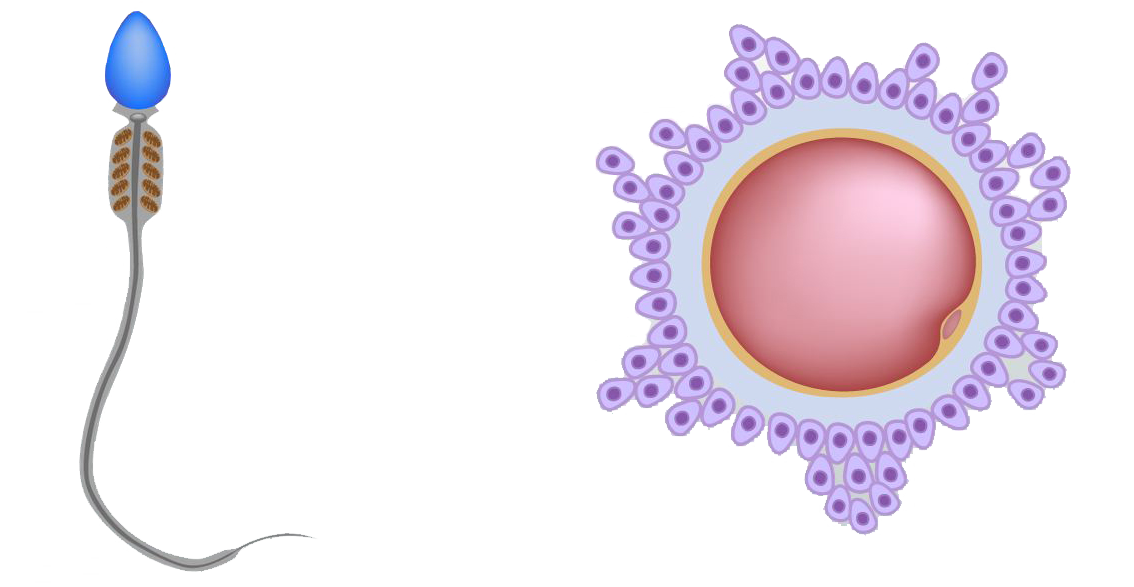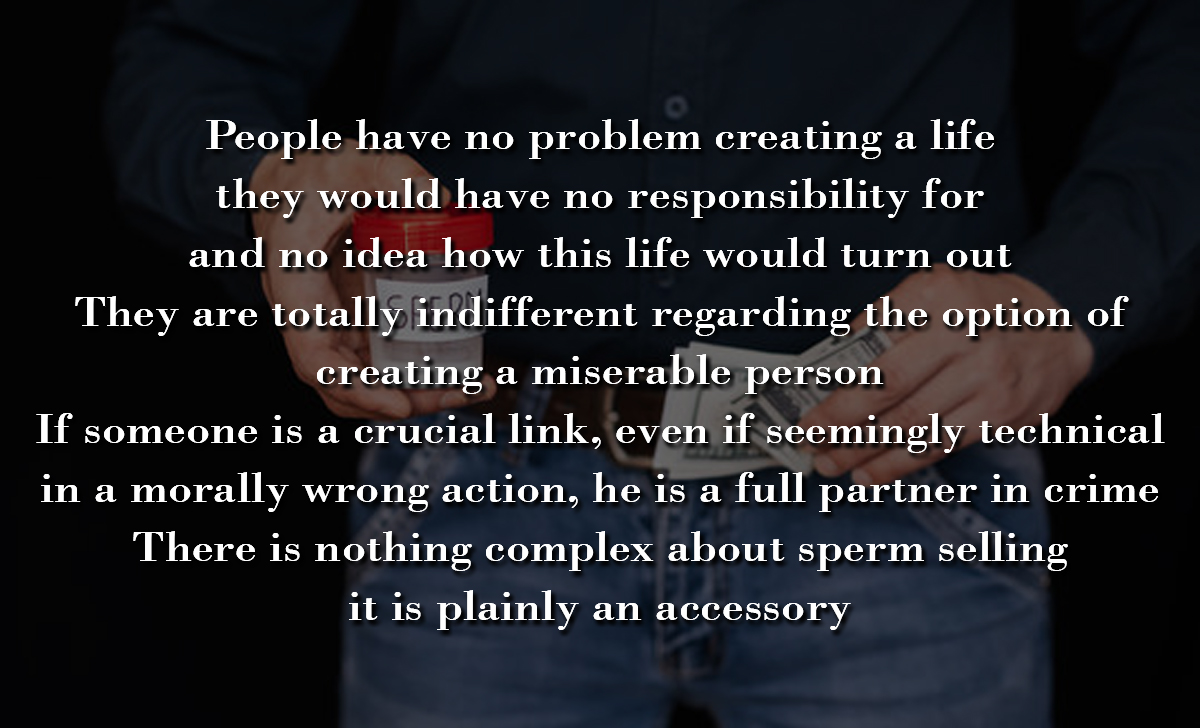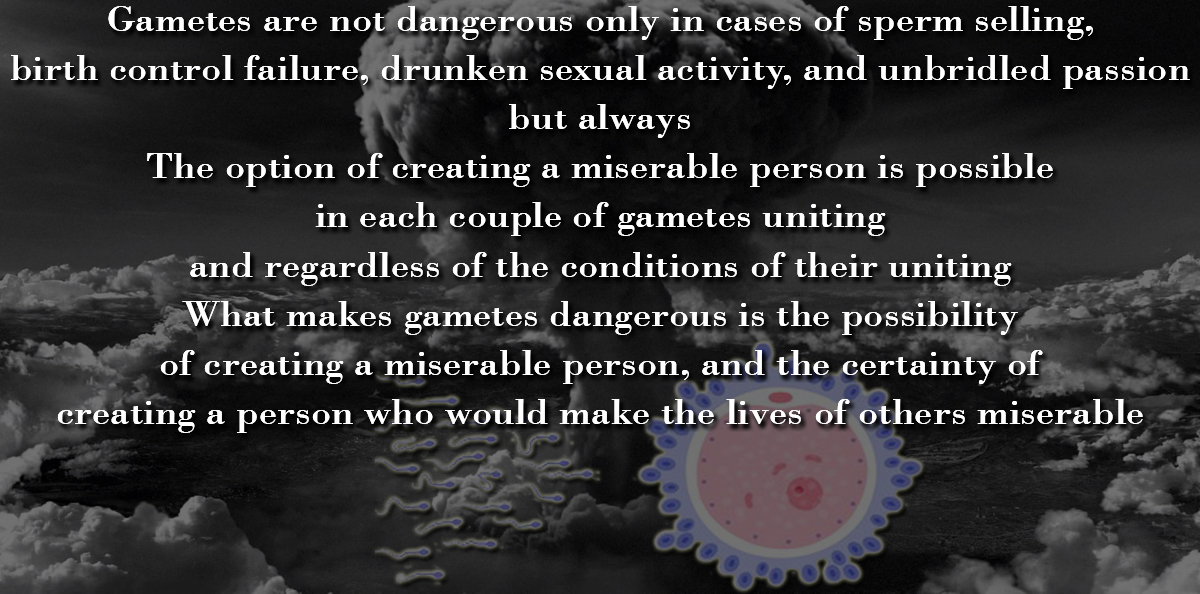
In an article called Is Having Children Always Wrong? philosopher Rivka Weinberg claims that she has yet to find an argument to support antinatalism, and criticizes Benatar’s. Ironically, I think she can find a very convincing argument to support antinatalism in one of her own articles. The article is called The Moral Complexity of Sperm Donation, and although as the name suggests it deals with the moral complexity of sperm donation, not of procreation in general, on her way to argue that as opposed to common intuition, sperm donors do have parental responsibility, she presents a new parental responsibility theory which its most basic premise must also, and in fact first and foremost, entails antinatalism.
Parental Responsibility
Weinberg claims that we tend to assume that when a sperm donor sells sperm to an agency, he waives his parental rights, and is absolved of parental responsibility. “If we regard the donor as having parental responsibilities at all, we may think that his parental responsibilities are transferred to the sperm recipients. But, if a man creates a child accidentally, via contraception failure, we tend to assume that the man does indeed have parental responsibilities.”
In order to assess these contrasting intuitions Weinberg analysis various prevalent parental responsibility theories, and concludes that none of them can withstand scrutiny.
For example some argue that voluntarily committing oneself to be parentally responsible for a child is a sufficient parental responsibility theory. However, Weinberg counter argues saying it is uninformative since it does not tell us what counts as a voluntary commitment of this kind. “If it is the bare fact of an explicit commitment to parental responsibility itself, this theory will leave many children with no one parentally responsible for them since, often, children are born ‘accidentally,’ with no one who has explicitly made a parental commitment to them.” (p. 168)
The same problem rises from another common parental responsibility theory which claims that parental responsibility stems from intent to raise the child. But again this theory, like the voluntary commitment theory, may leave many children without anyone parentally responsible for them.
Others claim that the clearest way to determine parental responsibility is to seek the cause of the dependent child, to identify the proximate cause of the child’s existence. Weinberg rejects this theory despite the intuitive appeal “when we see a needy being, we may ask, ‘By whose doing is there this needy being?’ and the answer to that question seems to finger the person/s responsible for caring for the needy being. But it fingers too many people, including, perhaps, fertility specialists, domineering and demanding grandparents, the friends who brought that fabulous bottle of wine to dinner, etc.” (p.168)
She also rejects Gestationalism (a theory that finds the person who gestates the child as parentally responsible for the child) and Geneticism (a theory that finds the person whose genetic material is transferred to create another being as the new being’s parent), but I guess the objections to them are quite clear. So the last theory worth mentioning is a pluralistic account of parental responsibility that incorporates the various causal elements that contributed to the creation of a child. Weinberg claims that this theory spreads parental responsibility too broadly by granting it to genetic, gestational, custodial, and intentional parents, and she rejects it because when numerous people play these roles and claim or disclaim parental responsibility, there is no way to determine which of the claims are legitimate. “With so many candidates for parental responsibility, many children may be left with no one parentally responsible for them, since no criterion is granted priority over another.” (p.170)
After disqualifying the current common theories, she proposes a new theory of parental responsibility, which according to her, is more plausible than the alternatives.
But before detailing her theory, as an antinatalist myself and assuming all the readers of this blog are too, you are probably wondering why am I bothering you with the different parental responsibility theories, and whether sperm selling entails parental responsibility, and is there a difference for that matter between sperm selling and a contraception failure? So first of all to make it clear, obviously I don’t think it matters that much which parental responsibility theory makes more sense since they are all morally wrong (except for adoption which is more complex).
My first response to her title was that there is no moral complexity to sperm selling, but a moral simplicity, it is simply one of the biggest crimes a person can commit. Of course, every action contributing to making more people, and therefore more misery, is a crime, but selling sperm is doing it without even knowing or caring about the kind of lives the people they have contributed to create would be forced to endure. A person selling his sperm contributes to the creation of new lifelong vulnerability merely for some extra cash.
How can someone indifferently jerk off into a cup knowing that it might condemn someone to a life of misery, and most certainly condemn thousands to a life of misery?
People have no problem to create a life they would have no responsibility for and no idea how this life would turn out.
A sperm seller is responsible for so much misery since hadn’t he sold his sperm, at least one person wouldn’t have existed. The claim that ‘if it is not me it’s the other guy’ doesn’t hold since the claim against sperm selling is not personal but general and fundamental, it applies to everyone, and so, had every person who ever sold his sperm, considered the dire consequences of his actions and didn’t sell his sperm, so much misery would have been spared. The fact that people have turned to the sperm bank means they couldn’t procreate by themselves and needed the bank. Had no one sold sperm to the bank, the children of these people wouldn’t exist. In other words, sperm sellers have a crucial part in creating people.
If someone is a crucial link, even if seemingly technical, in a morally wrong action, he is a full partner in crime. There is nothing complex about sperm selling, it is plainly an accessory.
Sperm selling is an appalling contempt towards the effects of creating life. And by agreeing to acquire sperm, society sends people a clear message, come and “donate” whoever you are.
Weinberg is right in claiming that people are mistaken in their intuitions, attributing parental responsibility to contraception failure but not to an aware contribution to someone’s creation. Contraception failure is a case of irresponsibility but not of total carelessness. People using contraception didn’t want to create new life, at least not in that particular time, evidently they tried to stop the sperm from reaching the ovule. A sperm seller on the other hand doesn’t even care what will happen with his sperm, who would it reach, what person would it create, whom would that person hurt, and how much that person would be hurt. This is how low life and suffering are valued in our world.
Having said that, I am bothering you with this article because I find the premise of her alternative parental responsibility theory very interesting, and as mentioned earlier, one that is supposed to satisfy her own proclaimed quest for a convincing antinatalist argument.
The Hazmat Theory
Here are the basics of her parental responsibility theory, brought extensively and in her own words:
“I’d like to suggest that parental responsibility is derived from our possession and high degree of control over hazardous material, namely, our own gametes. Our gametes are dangerous because they can join with the gametes of others and grow into extremely needy innocent persons with full moral status. Being in possession and control of such hazardous material is a very serious responsibility. The enormity of the risks gametes pose generates a very high standard of care. In that respect, gamete owners are comparable to owners of pet lions or enriched uranium.
Dangerous possessions under our voluntary control – e.g. enriched uranium, a loaded gun, viable sperm – generate an extremely high standard of care. When we choose to engage in activities that put our gametes at risk of joining with others and growing into persons, we assume the costs of that risky activity.” (p.170)
“It seems to me that the cost of being born without specific people highly responsible and committed to one’s care are far more serious than the cost of being restricted from engaging, cost free, in behaviour that risks having a child created from one’s gametes. That does not mean that engaging in behaviour which risks creating a child from one’s gametes is wrong or inconsiderate per se. It just means that the costs of engaging in risky behaviour with one’s gametes belong to those who engage in it. Parental responsibility is a cost (or reward) of the risks we choose to take with the hazardous gametes we possess. Thus, parental responsibility is incurred when we choose to engage in activities that put our gametes are risk of joining with others and growing into persons, and persons result from those activities.” (p.171)
The Hazmat theory does not distinguish between the case of contraception failure and sperm selling since both involve voluntarily engaging in activities that put their respective gametes at risk of joining with others and growing into persons, and so when persons result from their respective activities, both are parentally responsible.
A sperm seller is parentally responsible for persons created with his sperm, since selling sperm to a sperm bank, currently gives the seller no information or control over which person or persons will gain control of his hazardous materials. According to Weinberg, this reckless transfer of parental responsibility, makes sperm sellers parentally responsible for persons created with their sperm.
Weinberg analogies:
“Surely, selling your enriched uranium to a uranium brokering agency won’t absolve you of responsibility for the nuclear explosion that may result. Enriched uranium is so volatile and dangerous that it is not easy to transfer it safely and reliably. In order to transfer your enriched uranium permissably to someone else, the transfer would have to be undertaken with extreme care, investigation, and caution. Current practices of sperm donation in many countries, including the USA, fall far short of any claim to the very high standard of care that transferring such hazardous material would demand”. (p.172)
The reason I claim that her theory is actually antinatalist, is since gametes are not dangerous only in cases of sperm selling, birth control failure, drunken sexual activity, and unbridled passion, but always. “Nuclear explosions” are not exclusive to sperm selling, they happen all the time, and by various methods of procreation, to various parents, without their control, and regardless of their initial intentions.
The option of creating a miserable person is possible in each couple of gametes and regardless of the conditions of their uniting. What makes gametes dangerous is the possibility of creating a miserable person, and the certainty of creating a person who would make the lives of others miserable. So it can be argued that a sperm seller is worse than others as he doesn’t even know or care about the results of his activities with his gametes, but their hazardousness remain in every other case of procreation as well. Miserable lives are produced all the time by gametes uniting, without sperm selling, birth control failures, and alcohol. And misery to others is produced every single time gametes unite and no one stops them, absolutely regardless of parental responsibility.
The premise of Weinberg theory, referring to gametes as hazardous materials such as enriched uranium, or a loaded gun, constitutes a very good reason to why people mustn’t breed. And the fact that people are in involuntary possession of their gametes and as she claims are naturally inclined to risky gamete-owning behavior, or in other words, humans are inherently armed with massive weapons and are naturally inclined to use them, is a very good reason why they must be disarmed.
References
Weinberg Rivka The Moral Complexity Of Sperm Donation
Bioethics ISSN 0269-9702 (print); 1467-8519 (online) doi:10.1111/j.1467-8519.2007.00624.x
Volume 22 Number 3 2008 pp 166–178


Leave a Reply